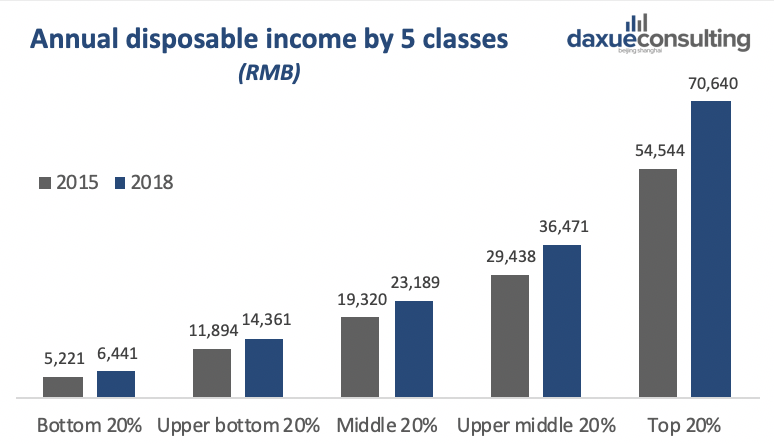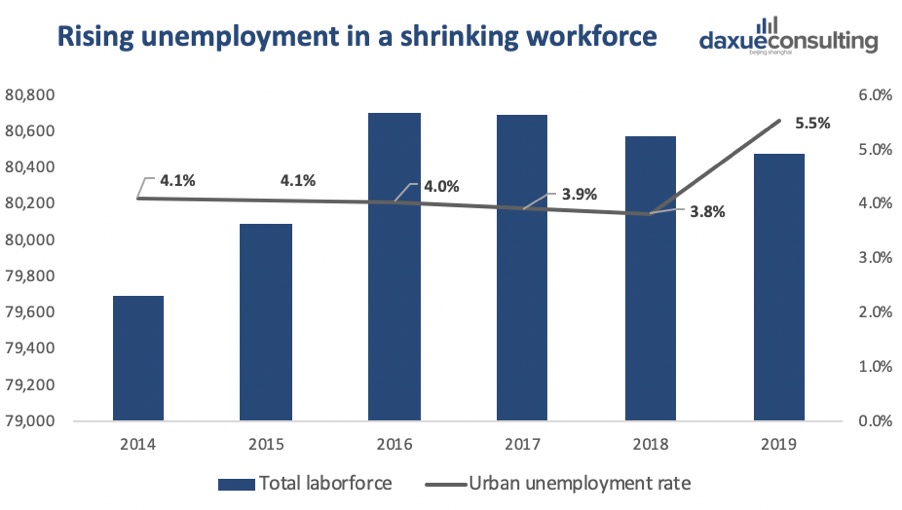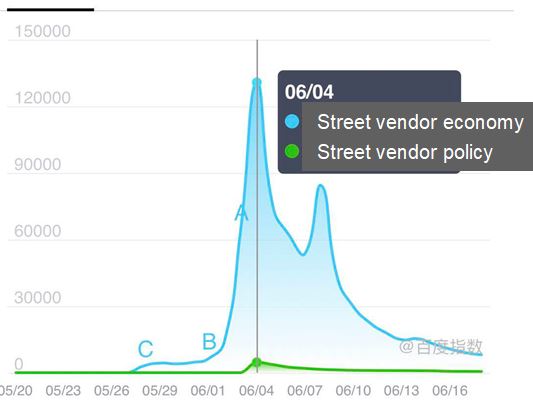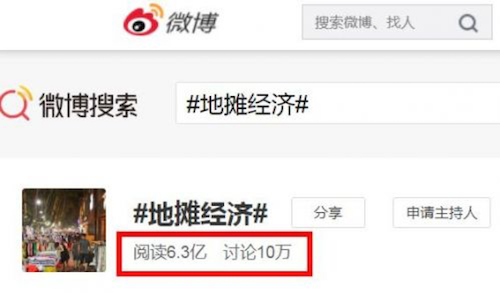China’s street vendor economy: A band-aid or permanent solution for post-COVID-19 unemployment?
China’s street vendor economy transfers earnings from the store owners to lower-income people. In contrast to the blue-ocean strategy, which creates significant economic value with innovative or disruptive solutions, street vendors use existing business models while cutting operation costs. It will not make people rich, but it is effective at turning unemployed people into self-employed workers while diversifying the local access to daily consumer goods.
Why China’s street vendor economy suddenly boomed
The long-time enemy of the proper city image
Street vending is not a newly coined word. In 2010, there were over 20 million street vendors registered, and this number could reach 35 million if unregistered ones were included.
Over the several past decades, “street vending” had always been synonym of “dirty, cheap, low quality”. It was the target of elimination in urban planning, and sometimes led to guerilla-like hide-and-seek, between strict city administrators and unrooted vendors.
The reasons for this severe, if not inhuman treatment include three layers of considerations
Firstly, the quality and authenticity of the products sold on street were not guaranteed or certified. There were often counterfeits which hurt the consumers’ rights, yet the vendors were not traceable and thus could not be held accountable after the transaction.
Secondly, the fluid public activities were threatened. Since the street vendors weren’t registered or certified, the locations of their operations were not predetermined according to city planning. In addition, some vendors made loud broadcasts about their products, which was a source of annoyance to many. These posed risks on a city’s basic function and on habitants’ daily activities.
Last but not least, litter of street vendors damaged the beauty and hygiene of the city. Since the random locations were not under the vendors’ responsibility, it was difficult to incentivize vendors to clean up before they changed location. What’s more, if the town hall was not as harsh in eradicating street vending activities, there would be more people taking their chances, putting the city order in jeopardy.
To sum up, it was a highly informal and grey economic sector where self-employed people, good-intentioned or not, bypassed the regulations and were at the mercy of passers-by and police.
The Post COVID-19 high unemployment rate provoked the sudden endorsement of street vendor economy in China
With China’s economy hurt by the COVID-19 and the GDP growth rate being uncertain, boosting employment is a natural path to revive economy. The Prime Minister Li Keqiang mentioned more than 40 times in the opening of 13th National People’s Congress in May 22th that his priority is to promote employment.
Keqiang is particularly concerned with the bottom-of-pyramid, poor population. According to National Bureau of Statistics of China, there are about 600 million people living with a monthly disposable income of only around 1,000 RMB, equivalent of $4.2 per day. While China is reaching a comprehensive construction of a moderately prosperous society by the end of 2020, the income inequality is still a serious issue. The top 20% is accumulating fortune at the fastest pace, and the bottom 20% is barely lifted out of poverty.

Data source: National bureau of Statistics of China, Annual disposable income in China by class
With the economic slowdown, the number of unemployed urban dwellers reached a record high after years of decrease. Many lost jobs or suffered from a salary cut due to COVID-19. Not to mention, the bottom-of-pyramid population whose livelihood was threatened even more.

Data source: National bureau of Statistics of China, Rising unemployment in China
Under this context, the Civilization Office of the Central Communist Party Committee has explicitly excluded occupying the road as one of the civilized city assessments by end of May. Suddenly, everyone became interested in China’s street vendor economy and wanted to profit from it.
On Baidu index, the blue line shows the search index of “Street vendor economy”, which soared in early June. It is accompanied by the search of “new policies of street vendor economy”, as people enquire about the legitimacy of this potential opportunity.

Source: Baidu index, search of Street vendor economy skyrocketed
The business case for China’s street vendor economy
The benefits of the street vendor economy
The items sold by the street vendors are usually low-unit-priced daily necessities, such as clothes, food, beverage, fruits, electrical appliances, nothing too fancy or high tech.
The obvious value created by street vendors are therefore two-fold. On the one hand, the vendors enjoy an additional stream of income, however unpredictable. On the other hand, the habitants living in the neighborhood have an easier access to daily necessities. Street vendors, therefore, contribute to the resolution of the famous supply chain issue in fast-moving consumer goods: last mile delivery.
The deeper value created by street vendors are also two-fold. Firstly, the nominal unemployment rate will drop, meaning that the human capital is put to use. Secondly, the local consumption heavily curbed by COVID-19 will be somewhat revitalized, largely thanks to the convenience of night markets.
The Prime Minister Li Keqiang stated in a press conference of the recent National People’s Congress held in May, that there are 200 million people in China working in unofficial, self-employed mode, and that the government has to support them by lifting unnecessary limitations. He publicly praised Chengdu for creating over 100 thousand job opening by setting up 36,000 street vending stalls legally. Zhou Tianyong, Director of China Center for Strategic and Policy Studies under Northeast University of Finance and Economics, estimated that 50 million jobs could be created with the promotion of China’s street vendor economy.
The inherent drawbacks of the street vendor economy
Will street vending be effective in reviving Chinese economy?
The shortest answer is no. The Chinese economy has three major drivers: investment, exportation, consumption. The China’s street vendor economy is not in any way even comparable to them. It is, however, a mechanism to alleviate unemployment for certain cities and a way to earn the next meal for the unemployed.
A longer examination looks at whether it is a profitable business, worth giving it a try
First of all, it is not a scalable profession. The vendors are required to literally start from scratch every day in one physical spot, limiting their marketing reach. Even if the town hall allows for street vending, it only gives permission to certain streets on certain hours. Usually, the street vendors are only allowed to operate in the evenings when the public roads are least occupied and can thus serve as a night market. It is therefore difficult to build up a large customer base or a brand. Without the trust from loyal customers, the range of business street vendors can aspire to is limited, often to food and beverages, fruits, books, toys etc. .
Then, street vendors are hardly meaningfully differentiated. They are usually the retailer, not the manufacturer, so whatever they can source, others can too. As they are spared of the rent on the public roads, the entry barrier is practically non-existent. This gives rise to high and almost perfect competition and erodes profit margins for everyone.
Finally, the legal environment still poses uncertainties. The central government officials haven’t given a unanimous direction on this issue and local policy makers are still pilot testing. While there are 27 cities publicly endorsing the street vendor economy, their policies are to be unpolished and subject to change. This uncertainty prevents people from investing too much upfront. Yet without investment, it is even more difficult for the unemployed to create the much-needed differentiation to make ends meet.
At its core, street vending is an elementary business model, existing way before the advent of mobile payment and e-commerce. It is therefore fundamentally difficult for street vending to reclaim important market share away from its enhanced counterparts of retail.
A successful future of China’s street vendor economy depends on public and private collaboration
Key success factors for street vendors
As it is a basic retail business, the 4Ps in the marketing textbook can serve as a guideline. The Product has to meet the essential needs of the local community, be it food or entertainment. The Promotion techniques such as portfolio bundling or discounts have to be perceived as meaningful. The Price and Place are the key purchase criteria, so competitive sourcing plays a big part. Those key success factors cannot be ignored if people want to participate in street vendor economy.
Furthermore, street vendors have to comply to the hard and soft regulations imposed on them. They’ve lost the trust in the eyes of government’s officials in the past by being short-term oriented. Now it’s their chance to show compliance and discipline, by making it easier for the city to manage them. Being a responsible and respectful player will benefit themselves in the process.
A dependable public policy stance
An important question for the government is whether it regards China’s street vendor economy as an end in itself or only a means to an end. If the local government only regards street vending as an expedient tool to boost employment and economy, without putting in place a legal framework that protects street vendors from precariousness of the profession, the future will not be bright. If one day the economy recovers in China, the employment rate climbs up and suddenly the street vending is again the enemy of an impeccable city image, millions of street vendors could be outlawed again.
Local circumstances vary and will largely determine whether and how street vendors are endorsed
Chinese cities are too diverse in terms of economic development and strategic positioning to adopt the same measure. Beijing the capital, shouldering the responsibility of national dignity, doesn’t take kindly to the prevalence of street vendors. Shenzhen the mega-city with the highest GDP per capita, is also cautious with the adoption of street vendor economy. Shanghai, on the other hand, blends the street vendors in its famous night market, while meticulously setting the obligations and rights of the self-employed vendors.
On Weibo, China’s biggest microblogging platform, street vendor economy reached over 630 million views in just days. The highest participated topic related to it is “warmed up but not in fever”. Over 33 million netizens expressed balanced view on China’s street vendor economy, supporting the “city by city” approach.

Source: Weibo, China’s street vendor economy has 630 million views
For local decision makers, it could be an opportunity to regulate this grey sector that shadowed the China’s street vendor economy for such a long time. Several measures could be put in place. First, register all the street vendors for a better management. Second, limit the time and space for street vending activities. Third, set up quality control measures to protect the consumers and keep hygiene. Fourth, take advantage of the internet to facilitate application, registration and tax issues.
Before, the government has been very harsh on the street vendors. As local policies gradually take shape, a more nuanced management system could benefit not only the unemployed, the community, but also the human image of the government in the eyes of the public. In fact, this is exactly what the local governments are doing. A more human but clearly defined boundary has been set for a better management of street vending activities. Transparency, accountability, order, convenience and entertainment are woven harmoniously in China’s new street vendor economy.
There is a possibility for a win-win future of China’s street vendor economy, which would allow it to once again become a part of China’s nightlife.
Author: Della Wang
Learn more about Chinese consumption after COVID-19
Listen to 100 China entrepreneur stories on China Paradigms, the China business podcast
Listen to China Paradigm on Apple Podcast
















